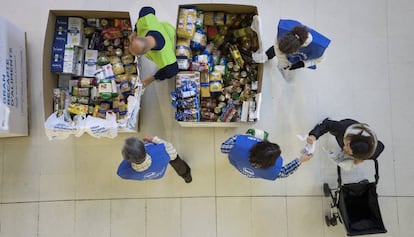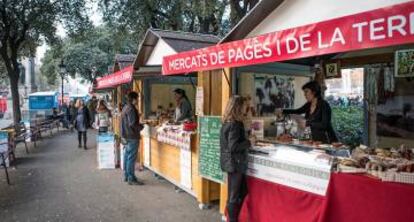Why Barcelona’s generosity at Christmas goes beyond religion
Charity campaigns are still part of traditional celebrations in spite of mass consumerism

Black Friday and Cyber Monday were just the teaser: according to a recent Deloitte study, Spaniards were planning to spend an average of 633€ per person for Christmas 2017. This is time for expensive presents, big meals and fancy clothes. But, as tradition demands, Christmas is also a time for giving. In spite of massive consumerism, some people say this religious festivity has not lost its original meaning – “To step closer to those who are in need,” as Pope Francis said in 2013.
Some 60,7% of Catalonia's inhabitants describe themselves as Christian, according to Spain's statistics office, the INE. Of these, however, only 3 out of 10 say they regularly go to church. These figures have prompted some experts to ask whether Spanish Christianity is more cultural than a truly religious phenomenon. Be that as it may, Christmas is one of the most successful times of the year for charity campaigns, especially in the city of Barcelona.
One example is El Gran Recapte (Big Food Collection, in English), a campaign that this year saw more than 4,300 tons of basic food items collected for people living in poverty. Over the course of one weekend, 27,000 volunteers spread the word about the initiative, received donations and organized them. They did it for free. Or, as volunteer Anna Sánchez says, “for the underlying values of this action: to promote social awareness and to help others in need.”
Barcelona en Comú, the party that rules the City Hall, has always detached itself from religion
Local public authorities also run similar initiatives. Barcelona City Hall supports a Responsible Consumption Fair, which aims at “showing city residents that both responsible consumption and local, social and solidarity economy are already a reality” in the city, according to the organization. This is one of the many activities that are part of the city’s official Christmas campaign based on the concepts of “solidarity,” “responsibility” and “awareness.”
This is remarkable because Barcelona en Comú, the left-wing party that runs City Hall, has always kept a distance from religion and has been reluctant to celebrate Christmas because of its religious background. When the party came to power in the local government in 2015, their proposal was to celebrate the Winter Solstice instead of Christmas. In 2016, it removed all religious symbols from the nativity scene and replaced them with historical Catalan cultural personalities. This year the city council has settled for a more traditional view of Christmas season, while avoiding the term “charity” and dismissing the idea that solidarity is a value that should be strictly associated with a religious background.
In this context, the City Council has set in motion different campaigns to promote social and environmental awareness, such as “Give non-sexist games and toys as presents,” “Sustainable Christmas,” “No child without a toy” and “It's better to adopt an animal at Christmas!”
How state schools celebrate this festivity
This debate surrounding Christmas and religion is also evident in the Spanish education system. Spain is a secular state: schools are allowed to decide to what extent they want to get involved in religious matters, but public centers of education cannot side with a specific form of worship. The question is, therefore, whether Christmas is still a Catholic celebration from which public schools should keep a distance.
At Els Encants state school in Barcelona, for example, students celebrate a “Winter Party” instead of Christmas. “We reject religious festivities,” says the head of studies at Els Encants, Noa Padín. At this time of the year, the school organizes workshops with the support of families and also holds some winter poetry recitals, but not much more. The school does participate in solidarity campaigns, but not at this time of the year. For instance, the school organizes “a book exchange and a second-hand cloth market” twice a year, Padín explains.
The evolution of religious values in Western societies

“The issue is no longer the secularization of Christian values, but the expulsion of this religion from Western culture, which is affecting all Europe,” says Josep Hereu, former teacher, philosopher and theologist. The diminishing role of this religion not only results in a radical change in terms of how schools approach Christmas, but has also effects on how civil society understands it. “Society wants to get rid of all Christian values, and I think this is a big mistake. It's a big loss in terms of human understanding and conception,” Hereu argues.
In Spain there are still many religious schools, for which Christmas is indeed a key date. “We think solidarity is a Christian and human value,” says Asun Pérez, a teacher of Pies Llúria School in Barcelona who is also in charge of the charity campaigns organized by the center. “We run campaigns throughout the year, but Christmas is definitely a more sensitive season for everyone. Proposals are better received.” The school collaborates in different initiatives, including collections of food and toys for people in need, or families with lower incomes. Seven years ago, a student proposed that the school gather clothes for homeless people. Now, this charity campaign is part of the Christmas celebration of this school, and involves all students from 2 to 18 years old.
Some schools have also brought forward initiatives with an international impact. An example is Projecte Llavor (Seed project), in which only the schools that are supported by the Piarist religious order can participate, including Pies Llúria School.
This project aims to help children who study at other Piarist schools in more poverty-stricken countries, like the Dominican Republic or Senegal, by sending them goods including crayons or sporting equipment. Over the years, the organization has realized that these type of campaigns work better than child sponsoring, as they make it easier for students in developing countries to get the goods they need the most.
According to religious anthropologist Gerard Horta, these Christmas welfare activities are “purely symbolic” and are sometimes done to “help give people a clear conscience.” Horta, who is a teacher at Barcelona University, is very critical of those who argue that solidarity is a Christian value. “If solidarity means caring for poor people, Western countries cannot be considered democratic civilizations; neither at Christmas, nor through the rest of the year.” The Church still does not practice what it has been preaching for centuries, says the anthropologist. According to him, Catholicism and Protestantism are “dominating cultures” that, on the one hand, exhort solidarity at Christmas, but, on the other hand, do not question “the exploitation and inequality that is practiced during the rest of the year.” Horta argues that the history of colonialism provides plenty of examples likely to change the minds of people who still believe that Christmas is all about charity, empathy and praying for the poor.
Philosopher Hereu does not agree: “I don't know if there's a link between consumerism and solidarity. As human beings in a postmodern society that has lost its traditions, we still have the need to connect with our roots and feel better about ourselves. Christmas is the perfect time to do this because it revives a tradition in a pragmatic way: through human solidarity.”
elpais.cat in English
From November 2016 onward, the Catalan edition of EL PAÍS, Elpais.cat, has been publishing a selection of news stories in English.
The texts are prepared by journalism students at the Pompeu Fabra University (UPF), who adapt content from Catalan current affairs, adding extra information and explanation to these stories so that they can be understood in a global context.







































